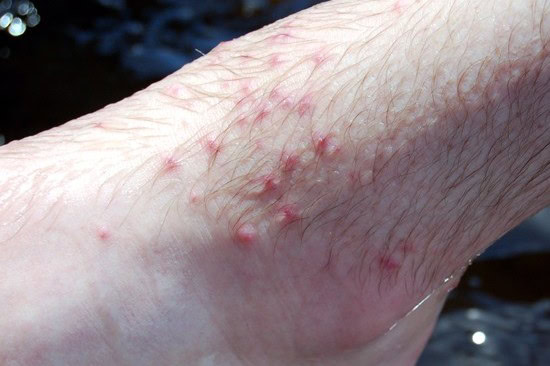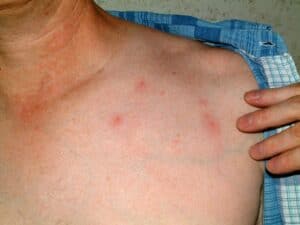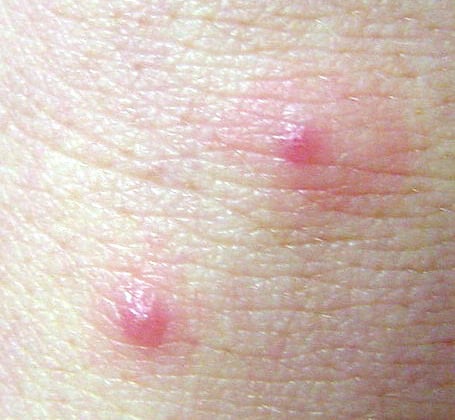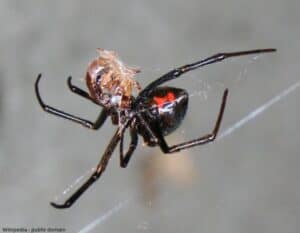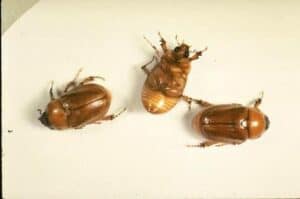How are mite bites caused?
If you are looking at this page it’s a safe assumption that you may have some sort of rash or bite. It’s also a safe bet that you’re not sure what caused it or how it happened. Hopefully, this information will shed some light on the subject.
Mites bite by attaching themselves to their host (the host being you) and using their spike like mouthparts to penetrate your skin and suck out fluids from your body. Remember the last time you had a delicious milkshake, well in this scenario you’re the milkshake and the mites spiky mouthparts are the straw. These mites will usually release when they have had their fill, however, sometimes they’re content to cling on for dear life until they just can’t handle it anymore and fall off. And some mites, such as scabies, go beyond the simple “gulp and go” method of biting and will actually burrow under the skin of their victims.
Evidence of the Bite
You probably already know the answer to this question; in fact you are probably scratching yourself with one hand while scrolling down with the other hand, but the most prominent evidence of mite bites are seen in the form of small, itchy red bumps on the skin. When mites attach to your skin, the saliva they secrete causes has an adverse reaction to your body chemistry. The body let’s you know something is off by sending a signal to your brain which leads to unconscious itching. Like with any bite or rash the redness will grow more prominent after you begin scratching away at the bitten area.
Although there are numerous mite species only a few species commonly select human hosts to snack on. So many may assume their bites were caused by a more common household pest such as a spider or ant. If you have spent a lot of time outdoors the suspect might even be a mosquito. When trying to figure it what is biting you, you may want to look at the pattern of bites. Mites tend to cluster, whereas spiders are solitary creatures, that bite incidentally. Given this, if the bite is caused by a mite it is more likely there will be several bites within the same region. Spider bites tend to be displaced over a larger area of the body.
The following information should help you identify if the suspect is one of a few notorious mite species:
Harvest Mites
(Chiggers)
Bites from Chiggers
- Harvest Mites bite humans or other mammals only in their larval stage.
- Harvest Mites are the most common mite species to have an effect on humans
- Their bite is painless as it is happening. It is not until later that the effects can been noticed.
- After feeding, the mite falls from the host and leaves in its wake a red swelling with a hard, white center. This welt comes with intense itching that is not terribly painful to scratch.
- Welts generally have delayed onset, meaning they don’t form immediately upon exposure, and they may be accompanied by a mild fever.
Itch Mites
Bites from an Itch Mite
- The bite itself isn’t felt but will cause the later (about 12 hours) onset of a small red swelling with a pimple-like elevation at the center.
- Initially, a bite is characterized as a red patch which has a small blister in the center. Redness around the bite expands and becomes painful to the touch.
- Individuals with extreme sensitivity have developed chills, fever, fatigue and nausea, or severe allergic skin reactions such as extreme itchiness and swelling.
- Itching may last up to a week or more.
- Itch mite bites are particularly painful when scratched.
- Itch mite bites are usually found on a person’s upper body (neck, shoulders, arms and chest).
- Itch mites generally prefer insects to humans, but people who are in frequent contact with hay, grass, and seeds may be bitten.
- They cannot, however, live on humans nor can they survive indoors, so they are not a huge threat.
Rodent and Bird Mites
Bites from a Bird Mite
- Rodent and bird mites are blood-suckers, and leave inflammation and redness around the bite.
- Like with other mite reactions, intense itching usually accompanies exposure.
- Rodent and bird mites prefer rodents and birds to people.
- On the other hand, if these mites find themselves without a host, they are willing to bite humans.
Mite bites and transmission of disease
The other thing you might be worried about is whether mite bites can lead to you contracting some serious life threatening disease. The good news is that mites rarely transmit disease directly. The risk with mite bites occurs because they often cause intense itching and severe itching can rupture skin and serve as entry points for infection.
However, a close relative to the mite is it’s slightly larger cousin the tick. Ticks are known disease carriers and are the direct cause of the spread of diseases such as lymes disease. So although mites have not been found to be major carriers of disease, there is the risk that what you have is not a mite bite at all.
That is not to say that mites have no effect beyond simple itching, mites can cause allergies that affect breathing, like asthma, or the skin, like eczema.
With all of the different types of mites out there it should come as no surprise that different mites have varying effects in humans, even effects that often resemble other conditions, like contact dermatitis or as mentioned early the bite of a common mosquito.
Treatment for mite bites
Since the severity of mite bites differs according to a wide-range of variables too dense to mention here, treatment for a mite bite may vary greatly. However, these steps are a good start.
- First, as soon as possible after walking through mite infested areas or being exposed to other mites, you should bathe in hot, soapy water and scrub down with a wash cloth. Cleanliness is key to preventing infection.
- If itching persists you may want to try oral antihistamines or application of a hydrocortisone cream. This step may help to relieve itching.
- Finally, if you develop a severe reaction, then consult your physician right away. After all a web page is no substitute for a Doctor.
Call today at 1-800-986-1006 for help with a mite infestation. You’re also welcome to complete our contact form and a caring Hearts Pest Management representative will contact you shortly.
